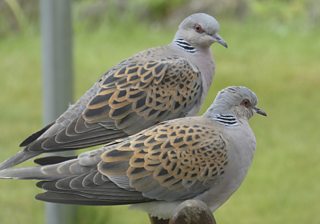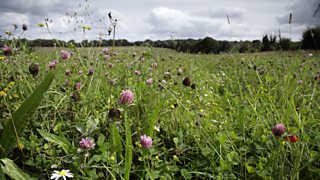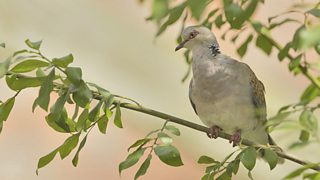
Two turtle doves perched. These birds are now our fastest declining species. (Katherine Carey RSPB Images)
How wonderful is it to welcome back our much-loved migrant birds at this time of year - especially when you live somewhere you are likely to see a turtle dove?!
The partnership was set up because this charming, iconic bird, beloved of Christmas songs and all manner of art and literature is sadly the UK’s fastest declining species. We need to act now to reverse this or lose them forever.
The latest results from the show the catastrophic 96% population fall from 1995 to 2019 in the UK. Estimates of population were just 3,600 breeding territories in the UK in 2016. Thankfully, research has and continues to help our understanding of the reasons for this, and there are a growing number of people and organisations taking action to help turtle doves. For this, we are extremely thankful!
Getting involved

A conservation advisor discusses suitable turtle dove foraging sites. (Ben Andrew RSPB Images )
Like the hundreds of people who have volunteered to take part in the this summer, coordinated by the (RBBP) and the RSPB with support from BTO and Natural England. Surveyors will be out early in the morning looking and listening for doves across much of England, so that we can establish a more accurate picture of current breeding numbers and locations, and so help guide conservation efforts to the most important areas.
And the many landowners, businesses and organisations who contact our dedicated every week for free help and advice on what they can do on their sites for these birds. And their help is very much needed. Research has shown up that long-term loss of the dove’s seed food sources on breeding grounds, compounded by unsustainable levels of hunting in south-west Europe on their migratory flyway, are having the biggest impacts.
Vital habitat and food sources

Arable plants on field margins provide much-needed food sources for turtle doves. (Andy Hay RSPB Images)
The once-plentiful weed seeds in the countryside have disappeared with changing land use. Studies showed that the number of chicks fledged by each pair of doves annually almost halved between the 1960s and late 1990s, simultaneous with a switch in diet to being much more reliant on crop seeds. More recent studies reveal chicks and fledglings doing better when there are more ‘weed’ seed-rich habitats available, but also increasing use of human-provided food – crops and bird seed – for adult doves.
Focusing our efforts on establishing feeding habitat over the dove’s core UK breeding range – mainly around East Anglia and South-East England – there’s anecdotal evidence it’s starting to make a difference.
Encouraging people to put out a specially formulated mix of seeds to supplement natural resources ensures the birds have sufficient food and is particularly helpful when they arrive tired and hungry from a long migration.
Other essential work

A turtle dove rests on a branch. (Ben Andrew RSPB images)
The RSPB has also been involved in a Test and Trial project as part of Defra’s Environmental Land Management (ELM) scheme, to see if reverse auctions provide a way of paying landowners to improve their sites for turtle doves.
The second bidding phase for this is imminent, and whilst we’re interested in the learning opportunities for future agri-environment schemes, we are especially pleased with the enthusiasm shown by farmers to help save the turtle dove. This will ensure more habitat for turtle doves across the region.
Doves overseas
Outside the UK, we monitor the situation on our turtle doves’ West African wintering grounds and have found no evidence that major problems for the doves exist here. Their migratory route is a different story and we work with Birdlife and other partners to tackle the other big issue contributing to the decline of turtle doves at the European scale– that of unsustainable hunting.
Again the combination of good scientific evidence, policy work and people power is driving change. In the last two years we have seen significant reductions in the numbers of turtle doves hunted in France and Spain – through which ALL UK-breeding turtle doves migrate. We remain optimistic that further reductions will happen this year and into the future.
For now, take a look at the website to find out what’s going on and how you can get involved to help ensure that turtle doves exist for future generations to enjoy in more than just our stories and Christmas songs.
